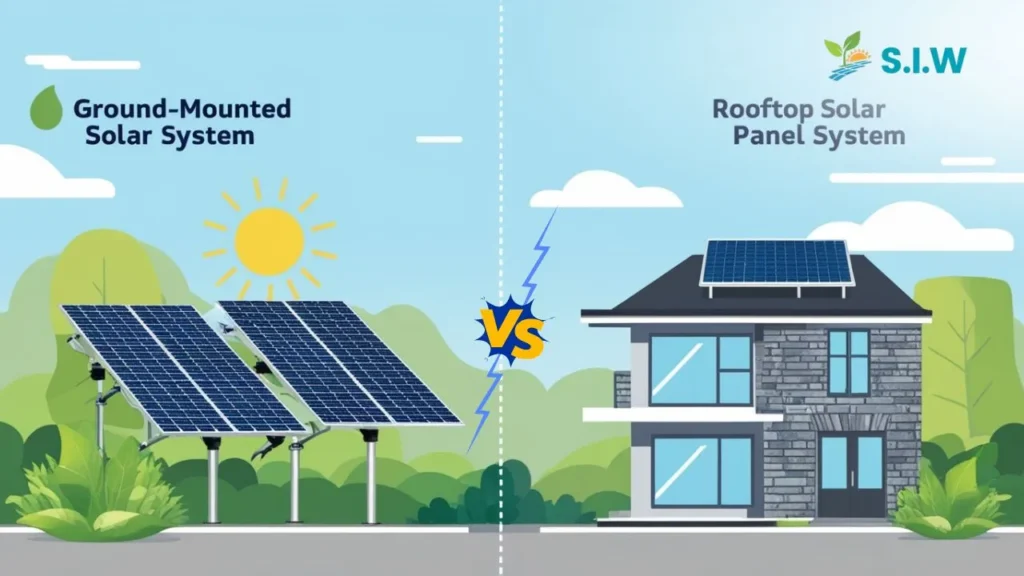As solar energy becomes an increasingly popular and cost-effective solution for homeowners and businesses, one crucial decision often arises: ground-mounted solar panels or rooftop solar panels? Both options have unique benefits and challenges. Choosing between them depends on various factors like space availability, cost, and efficiency. In this article, we explore these two systems in depth, so you can make the best decision for your energy needs.
1. Overview: Ground-Mounted Solar Panels
What Are Ground-Mounted Solar Panels?
Ground-mounted solar panels are installed on the ground rather than attached to a roof. They are typically set up using steel or aluminum frames and placed in large, open areas. These systems can be either fixed-tilt (static) or tracking systems (which follow the sun throughout the day).
Advantages of Ground-Mounted Solar Panels
- Optimal Sunlight Exposure: Since ground-mounted solar panels can be placed anywhere on your property, they offer more flexibility in positioning. This allows you to find the optimal spot with maximum sunlight exposure, improving overall efficiency.
- Ease of Maintenance: Ground-mounted systems are more accessible for cleaning, inspection, and repairs, reducing long-term maintenance costs.
- Better Cooling and Efficiency: Panels mounted on the ground typically have better airflow around them, which helps to keep them cool and boosts efficiency, especially in hotter climates.
- Scalability: Ground-mounted systems can be scaled easily depending on available land. This is especially useful for large-scale installations, such as commercial or utility solar farms.
Challenges of Ground-Mounted Solar Panels
- Space Requirements: Ground-mounted solar systems need significant land space, which may be a limiting factor for homeowners with smaller properties.
- Higher Initial Costs: The installation costs are usually higher compared to rooftop systems due to the need for additional structures, such as mounting frames and land preparation.
- Permitting and Zoning: In some areas, obtaining permits and meeting zoning regulations for ground-mounted solar systems can be more complicated.
2. Overview: Rooftop Solar Panels
What Are Rooftop Solar Panels?
Rooftop solar panels are installed directly on the roof of a building. This is the most common type of residential solar system. Roof-mounted systems utilize the existing structure, minimizing the need for additional land or materials.
Advantages of Rooftop Solar Panels
- Space Efficiency: One of the most significant benefits of rooftop solar panels is their efficient use of space. If you have a roof that receives plenty of sunlight, you can convert that area into an energy-generating powerhouse without sacrificing yard space.
- Lower Installation Costs: Rooftop solar installations tend to be more affordable because they use the existing structure of the roof, eliminating the need for additional mounting equipment and land.
- Aesthetic Integration: Rooftop systems are generally less intrusive in terms of visual impact compared to ground-mounted systems. Many modern designs seamlessly integrate with the building’s aesthetic.
- Simpler Permitting Process: Since rooftop solar panels are more common, obtaining permits is generally faster and easier compared to ground-mounted systems.
Challenges of Rooftop Solar Panels
- Roof Condition and Age: A rooftop solar system may not be feasible if your roof is old or in poor condition. Installing panels on a weak roof can lead to structural issues, and you may need to replace or reinforce the roof before installation.
- Limited Panel Placement: Rooftop systems are limited by the shape and size of your roof. If your roof is shaded by trees or nearby buildings, this can negatively affect energy production.
- Difficult Maintenance: Roof-mounted solar panels are harder to access for routine cleaning or repairs, which can increase long-term maintenance costs.
3. Efficiency Comparison: Ground-Mounted vs. Rooftop Solar Panels
The efficiency of solar panels depends on factors such as location, tilt angle, and access to direct sunlight. Here’s how these factors compare between ground-mounted and rooftop systems:
- Ground-Mounted Solar Panels: These systems offer more flexibility in terms of tilt angle and orientation, which can lead to higher efficiency. Since they are placed in open areas, they typically have better exposure to sunlight throughout the day.
- Rooftop Solar Panels: The efficiency of rooftop systems can be constrained by roof angle, orientation, and shading from nearby structures. However, for buildings with south-facing roofs and minimal obstructions, rooftop systems can perform just as well as ground-mounted systems.
4. Cost Considerations
Initial Installation Costs
- Ground-Mounted Solar Panels: Due to the need for additional mounting structures and land preparation, ground-mounted systems generally have higher installation costs. The upfront expenses for excavation, framing, and wiring can be significant.
- Rooftop Solar Panels: The installation cost is typically lower for rooftop systems because they make use of existing infrastructure. You don’t need to build additional support structures, and less wiring is required.
Long-Term Costs
- Ground-Mounted Solar Panels: Maintenance may be easier, but the overall installation expense is higher. However, the ability to position the panels in an optimal location can result in greater long-term savings through higher energy production.
- Rooftop Solar Panels: While maintenance is more challenging, the lower upfront cost can make rooftop solar a more cost-effective option in the short term.
5. Environmental Impact and Sustainability
Ground-Mounted Solar Panels
Ground-mounted systems often require significant land use, which may disrupt local ecosystems. However, large-scale installations can help achieve greater energy output, contributing to sustainability goals.
Rooftop Solar Panels
Since rooftop solar systems utilize already-built structures, they don’t require any additional land use, making them a more environmentally friendly option in terms of land conservation.
6. Which Solar System Is Right for You?
The choice between ground-mounted and rooftop solar panels depends on your property size, budget, and energy goals. If you have plenty of space and need a large system, ground-mounted solar panels may be the better option. They offer more flexibility in placement and potentially higher efficiency. However, if you have limited land or are looking for a more cost-effective solution, rooftop solar panels could be your ideal choice.
Each system has its advantages, but understanding the trade-offs will help you make an informed decision tailored to your energy needs.








